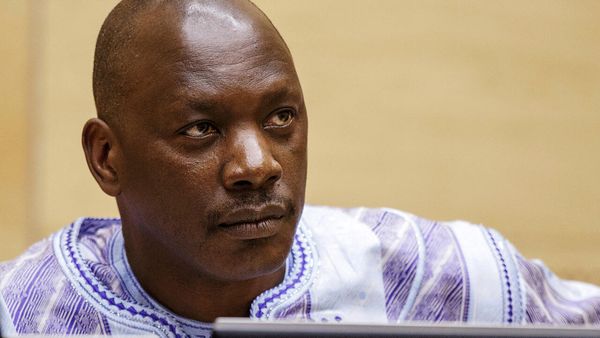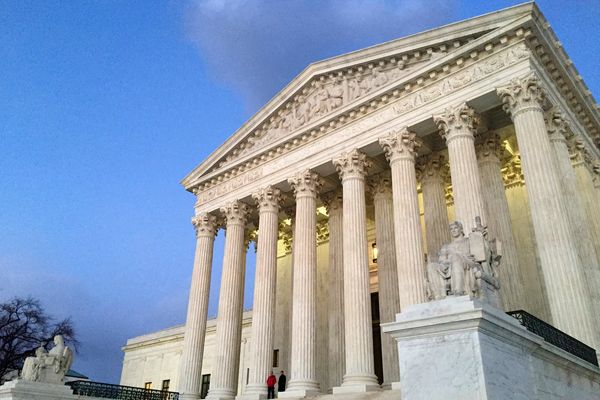“I was looking for an invasion of Downton by the 20th century in a fairly indigestible way — not just some character turning up for lunch but something that overturned order.”
Julian Fellowes, the creator of the beloved TV series “Downton Abbey” and the writer of the film of the same name released in theaters in 2019, says this during a recent video interview to promote its new sequel, “Downton Abbey: A New Era.”
He’s been asked what inspired the storyline in which a Hollywood film crew in the late 1920s comes to Downton Abbey — the Yorkshire estate home to the fictional Crawley family and their servants — to film a silent movie.
Early on in the production of “The Gambler,” the decision is made to turn it into a “talkie,” meaning dialogue will need to be recorded not only for scenes yet to be filmed but also for those that have been. This leads to numerous challenges, including a leading lady — Laura Haddock’s Myrna Dalgleish — whose stardom has come from being seen but not heard.
Fellowes says the idea came after a conversation with a colleague, who told Fellowes of his grandfather’s experience working on the 1929 Alfred Hitchcock film “Blackmail,” originally intended to be a silent picture.
“In the middle (of production, the crew) got this message from the studios that they had to change it to sound, and they had the invasion of the sound man,” Fellowes says.
Among the ramifications was the need to dub the dialogue of the film’s leading lady, Anny Ondra, who was said to have a strong Czech accent.
“Because they didn’t (yet have) looping and dubbing, they had to have another actress standing on the set saying the lines while (Ondra) moved her mouth,” says Fellowes, who in “A New Era” gives that task to Michelle Dockery’s Lady Mary, who by now is in charge of the estate.
“I was telling this story of Mary adjusting to the 20th century and finding she could fit in and the fact that she could, you know, do the job to keep this thing going,” he says. “She is learning to live with the 20th century without being too inhibited by it.”
The movie’s other major storyline sends a handful of “Downton” characters to France, but Fellowes says it was important they not stay away for too long.
“For me, the house is a pretty major character in the whole setup. And I don’t really like when they take a television show and they put the characters on a cruise or something,” he says. “It doesn’t quite work for me. I want them to get back to the setting of the series, and I didn’t want people to feel they’ve been deprived of Downton the house.”
In this conversation — which has been edited for length and clarity — Fellows speaks about his long journey with “Downton Abbey,” as well as his new series “The Gilded Age,” set in the cutthroat social scene of 1880s New York City. Initially slated to air on NBC, the show debuted in February on HBO and has just gone into production on its sophomore season.
Q: Congratulations on both the movie and “The Gilded Age” finally coming to TV after a delay. Were you working on both of them simultaneously or were you able to get “The Gilded Age” completed for that first season and get back into “Downton Abbey”?
A: You probably know that when you write a script, you never stop, writing different bits of it until the last edit is looped and the last thing is in the can. You know, you’re still fiddling with this and that at the beginning of every week’s filming.
But I enjoyed both shows. I think they’re quite different in tone and different in sort of texture, which I enjoy. I think I’m a lucky boy.
Q: You were ultimately happy with how “The Gilded Age” came together for its first season?
A: Oh, yes, I was very happy. I thought, “Once again, we’ve got a fantastic cast.” And that was very thrilling. I mean, right down the supporting cast. They were absolutely marvelous, as they are in “Downton.” You’re very, very cast-dependent in these things. You can have the funniest script or the most brilliant cinematographer, but if you haven’t got the right cast. It just doesn’t happen. And so it’s very exciting when you do get a really good one.
I’m very pleased with “Gilded Age.” It’s quite nice to be writing this more, sort of bitter, more angry, more driven drama. Funny, too. And romantic — it has those elements. But in the end, “Gilded Age” is about a great game, and there were great stakes to play for — and they played for them.
And I think it was a period in which Americans, unconsciously perhaps, were preparing themselves for the century that they would dominate because the 20th century would be the American century. We can say that now because it’s finished. … They were the decisive voice at the end of the First World War, even though they only fought in it for a (brief) period.
And so this wasn’t a society in decline. I mean, a lot of “Downton” is about the general, gentle sort of taking in of the 20th century, hanging on to what can be hung on to but otherwise making adjustments as things settle now differently. There’s none of that about ”The Gilded Age.” This is about a group of gunmen arriving in town and shooting it up, really. And I like the difference in the energy of the two shows.
Q: Moving to “Downton Abbey: A New Era,” what did you learn from making the first “Downton Abbey” movie that you were able to apply to this sequel?
A: I don’t know, really. We were nervous with the first film because you never know when you take something and turn it into a different medium. You take a TV show, turn it into a film; you take a film, turn it into a play; you take a film and turn it into a ballet — whatever it is, there’s always a fear that that won’t work, that transition, And sometimes it doesn’t, so it’s not a fear based on nothing. We’ve all seen moments where it didn’t quite work. And so when we realized there was an audience for “Downton” in film form, that was a very happy moment
I enjoyed (making it). I enjoyed this one. It’s funny to be working on something for so long. … It’s extraordinary that here we still are, calling each other by the same names and going on with the same story. It’s been extraordinary.
Q: With both movies, you have many characters to juggle, and I’m wondering about trying to find that sweet spot where you give everyone at least a little something. How difficult is that for you, the writer?
A: I think if you choose this form, this kind of multi-narrative, multi-arc story, some of the arcs are the main stories, so they have people with lots to do. And some of them are much more modest stories, and there are really two or three scenes. Nevertheless, I think you’re absolutely correct that the difference between a film and television is that in television, (a character) can have a decent story once every three or four episodes, and the other episodes, you’re just there sort of peeling the sprouts and getting on with it. And that’s fine. And the actors know that in an episode or two, they’ll be given something else. That isn’t fine in a film; everyone in the film has got to have a reason for being there — they’ve got to have their story. And so that is what you’re trying to do.
I think all jobs have difficult areas that you have to deal with … so I don’t feel we have to be particularly sorry for screenwriters because they are faced with this challenge. And I think that is the challenge of screenwriters and particularly when you’re working with so large a cast. I hope, you know, we brought it off. I can’t really say more than that, but I think the actors are quite happy, so I think perhaps we did.
Q: I have my guesses, but are there two or three characters whom you’ve always enjoyed writing for the most?
A: I never normally answer this because I love them all — I made them all. And honestly, we have gone uphill and down dale so many times with all of them by this stage — I’ve cried at their woes and given birth to their babies.
Of course, there’s fun when you write a line that could be funny … if the actor can get the laugh. And that is always a source of relief when you’re sitting in the cinema and they do get the laugh and you think, “Oh great!” Sometimes they make it work better than you thought.
Q: Lastly, I assume if it’s up to you, we won’t have seen the last of the family Crawley?
A: I don’t know. I never know the answer to this. although as you can imagine, I get asked a lot. Well, I keep thinking it’s probably the end, and I like to write it (in a way allowing) that if it is the end, that’s OK. But if they want more, then I’m sure we’d be delighted to give it to them.
So, you know, that’s not really an answer. Anyway, that’s the best I can give.
———







